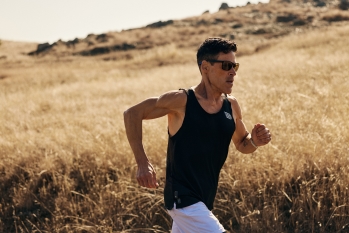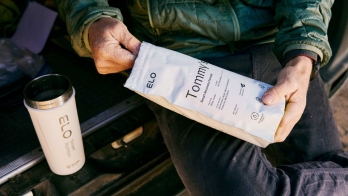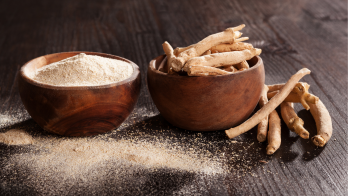Health, wellness, and football: A candid conversation with Joe Thomas
In the world of professional sports, few names shine as brightly as Joe Thomas. Learn more about his life, career, and wellness insights in this exclusive interview with Elo Health.

Contents
What are the passions and pursuits that define this chapter of your life? What is your relationship to health and wellness, and how has it played a role in your life as a pro athlete compared to now? What stands out about Elo, and what are your thoughts on personalized nutrition products? What are some of the biggest lessons you have learned from being in the NFL, and how do you carry out those lessons today? What do you typically eat in a day and what supplements do you integrate in the morning, for a workout, and in the evening? What does your workout routine look like? What is a dream you want to act on now?In the world of professional sports, few names shine as brightly as Joe Thomas. A true legend in American football, Joe Thomas has not only etched his name in the annals of the National Football League (NFL) but has also been inducted into the hallowed halls of the Pro Football Hall of Fame. His remarkable career as an offensive lineman for the Cleveland Browns is one that continues to inspire athletes and fans alike.
In this article, we are talking with Joe to better understand about how his career has shaped his views on health and wellness. Read on to learn more about this gridiron icon.
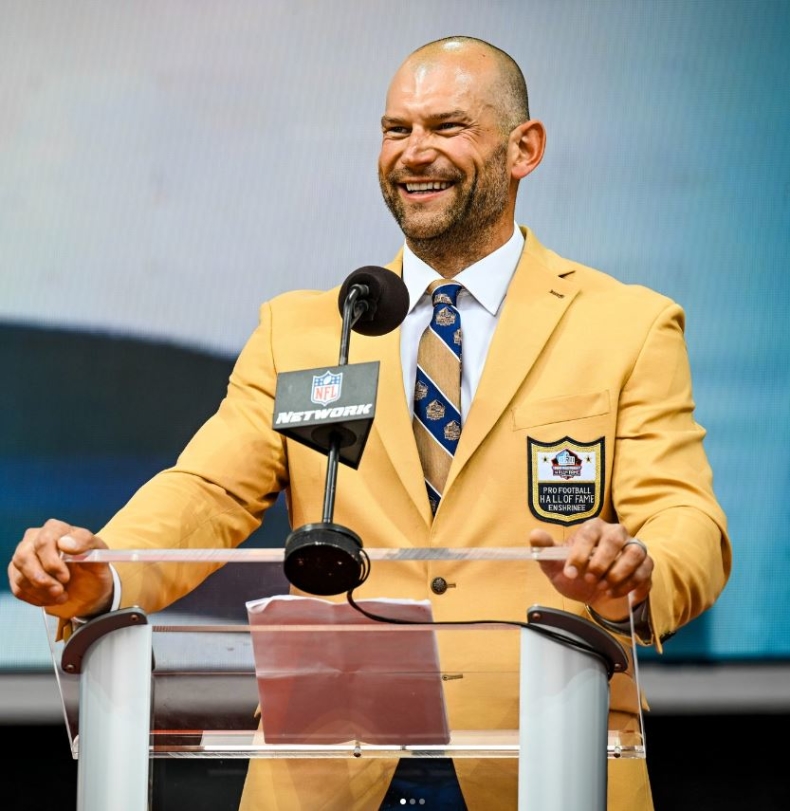
What are the passions and pursuits that define this chapter of your life?
Now that I am done playing football, I have really transitioned into the role of father and husband in a greater capacity. I love spending time with my kids, whether coaching my daughter’s track and field team or son’s football team.
Teaching my kids about the significance of food and actively participating in its growth is very important to me.
I love working on my farm, being in my garden and raising my own food as much as possible. I started growing my own garden for the first time after my rookie season in the NFL. Then I really got more and more into it after the NFL. It’s taken on different shapes and forms over the years, and it's always been a lot of fun challenging myself with growing new things.
As I transitioned from the NFL, my focus on health and wellness took on a new dimension. The motivation initially was to shed weight and, more importantly, to enhance my overall energy levels.
I was always intentional about what I ate when I was playing but it was for different reasons. I was always trying to keep weight on or gain weight so I ate food that some that many think is bad for you just to get the calories in after burning so many in a day.
Consuming around 10,000 calories a day, much of it in the form of processed carbohydrates and refined sugars, was a necessity to offset the calories burned during training and games.
Retirement provided an opportunity for a paradigm shift in my approach to nutrition. I delved deep into the health and wellness space, reevaluating not just what I ate but also the supplements I put into my body. This journey was born out of a genuine desire to feel better after enduring 11 years in the NFL, where, despite outward appearances, I was grappling with chronic pain beneath the surface.
The intentional shift towards a healthier lifestyle, both in terms of diet and overall well-being, has been a significant aspect of my post-football journey. It's not just a personal quest but also a commitment to sharing my experiences and insights with others who may be on a similar path to improved health and vitality.
What is your relationship to health and wellness, and how has it played a role in your life as a pro athlete compared to now?
Over the years, my relationship with health and wellness has undergone a significant transformation, taking a complete 180. The shift in my overall education and understanding of how food affects the body has been profound.
Back when I was playing, I wish I knew then what I know now about the impact of food on our well-being.
My focus on volume, carbs, and sugars, given the demands of my training, led me to overlook the inflammatory effects of these choices. It wasn't until later, in my post-football journey, that I was able to experiment with my diet intentionally and observe how it influenced my body and overall well-being.
Through trial and error, I discovered what types of food work well for me and what doesn't. The realization of how significantly food affects the body made me a true believer in the power of nutrition.
I did not realize the extent to which processed carbs and refined sugars were affecting my body until I experienced a substantial inflammatory response.
Feeling like a whole new person, I delved into the intricate connection of understanding how certain foods impact my energy levels and digestion, the need to rotate some elements in and out of my diet, and the role of digestive enzymes became crucial aspects of my journey.
Fasting emerged as a powerful tool, impacting energy levels and reducing inflammation. I started noticing the effects when I embraced the keto diet and eventually felt the transformative effects of becoming fat-adapted. Incorporating 24-hour fasts revealed how different I felt, prompting me to explore training with varied diets and experimenting with supplements to optimize my well-being.
A pivotal moment in 2018 was recognizing the correlation between my nutrition, supplements, and workout recovery. The direct link between the foods and supplements I consumed during workouts and the soreness in my body became evident.
This awareness led to a meticulous approach, altering my nutrition and supplements based on the type of training to enhance recovery and minimize soreness.
In essence, my post-football journey has been marked by a deep exploration of the profound impact of nutrition on how I feel, perform, and recover, a journey that continues to unveil new insights and possibilities.
But now actually being able to tinker and toy my diet and being intentional and seeing how it made me feel and seeing how it would change my body for better or worse.
It gave me an appreciation for how much food and supplements affect you significantly. How you feel, the energy you have, recovery, performance - things I would have never been able to appreciate had I not actually gone through this myself and seen the difference.
What stands out about Elo, and what are your thoughts on personalized nutrition products?
I've found an incredible synergy between my supplement routine and Elo. The seamless integration enhances the effectiveness of my daily regimen, which includes magnesium, berberine, vitamin B3, omega-3, ALA, CoQ10, and turmeric.
What drew me to Elo, even before becoming an investor, was its tailor-made approach to nutrition.
After retiring, I embarked on a personal journey, experimenting with various foods and diets to understand their effects on my body. It became clear how individualized diet, nutrition, and supplement responses can be.
Elo stands out because it caters and customizes supplement approaches precisely to your needs.
The constant updates and feedback through new tests ensure that you are on the right track. This real-time feedback is crucial for people to stay committed to their health and wellness journey.
One of the standout features of Elo is the integration of blood tests to assess the positive effects of the supplements. This not only provides tangible evidence of the product's impact but also encourages individuals to make informed decisions for their long-term well-being.
Having experienced personalized nutrition products in the past, what sets Elo apart is its accessibility. The ease of having it shipped directly to my house and the minimal time commitment required for compliance make it a user-friendly solution.
Elo's results, in my experience, surpass others. By tapping into a global network of education, doctors, and scientists, Elo provides a wealth of knowledge, research, and experience, offering a personalized approach that goes beyond the insights of a single individual. It's a holistic solution that considers the diverse perspectives from experts worldwide.
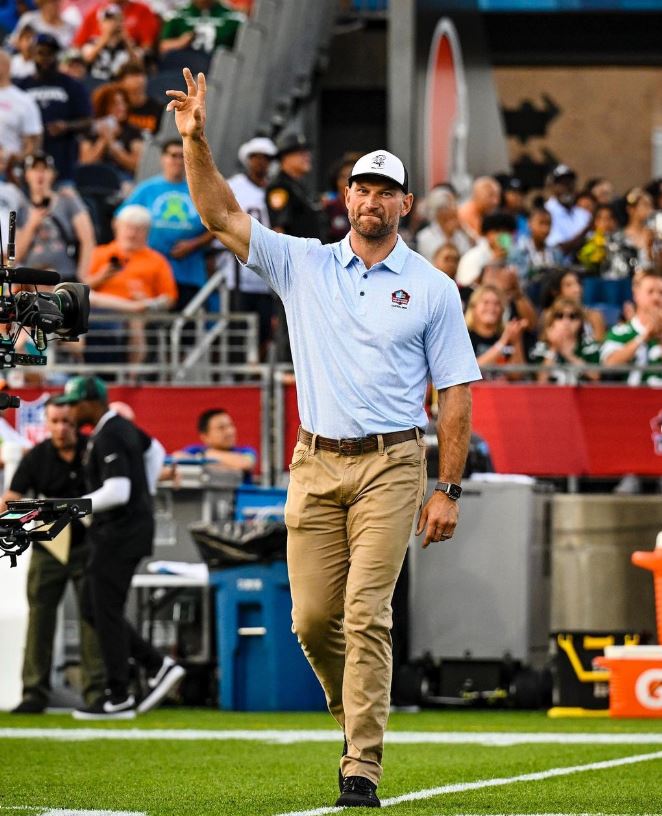
What are some of the biggest lessons you have learned from being in the NFL, and how do you carry out those lessons today?
In my role as an offensive lineman in the NFL, my responsibility was to serve and support my teammates. The servant mindset I cultivated on the offensive line has carried over into my daily life, where I strive to be a good husband to my wife and father to my kids, providing them with everything I can—knowledge, education, and opportunities. This commitment extends to being a dedicated servant and leader in my community, emphasizing giving back and prioritizing the well-being of those around me over personal happiness. To serve all of those around me who have helped me over the years which has given me a lot of satisfaction.
This philosophy extends to my investment choices and the companies I believe in. Many of them, like Elo in the health and wellness sector, embody a servant-based approach.
Elo aims to empower individuals to enhance their well-being through supplements and health education, fostering happier and healthier lives.
My focus is on directing my energy towards companies that not only contribute positively to their communities but also make a meaningful impact on a global scale. It's a continuation of the servant mindset that has not only shaped my NFL career but also provides a sense of fulfillment in contributing to the greater good.
What do you typically eat in a day and what supplements do you integrate in the morning, for a workout, and in the evening?
When I initially started trying to lose weight, tipping the scales at 300 pounds, my approach was to cut down on carbs and eliminate processed foods from my diet. The transition eventually led me towards adopting a keto diet, resulting in weight loss of 60 pounds in approximately six months.
As I progressed, I decided to shift towards a more sustainable, long-term approach. A typical day for me now involves fasting before my workout, which essentially means sipping on coffee and preparing a workout drink comprising essential amino acids, 20g of Orgain clean protein, LMNT low-carb electrolytes, and branch-chain amino acids. Post-workout, I make sure I have a quality meal within 30 minutes.
My workout routine consists of strength training three times a week (on Mondays, Wednesdays, and Fridays), integrated with cardio and yoga sessions. After the morning workout, I eat a mixed breakfast featuring proteins like the eggs we get from our farm chickens, the beef we raise or the fish and game that I harvest. I usually like to pair that with complex carbs like oatmeal or beans for a steady lower glycemic carb burn. For recovery and muscle building, I follow a strategy of consuming a smaller portion size of dinner or an afternoon snack, often opting for nuts or leftover proteins. On Tuesdays and Thursdays, I do a 24-hour fast until dinner, focusing on a low-carb dinner with vegetables and protein, sticking to green cruciferous greens and homemade low-carb sauces or spice blends.
Weekends provide flexibility, allowing me to be more spontaneous when going out with friends. While I appreciate the social aspect of dining, I try to go towards a low-carb approach and maintain mindfulness around my eating habits. However, I do let myself enjoy pizza or other favorite foods that aren’t as good for your body, but socializing and eating with family or friends is important for your mind; I just try and be mindful of when I’m doing that and how often I’m doing it!
Reflecting on my past as an NFL player, where consuming 10,000 calories a day and being 300 pounds was the norm, my mindset has shifted. Now, the emphasis is on being mindful and intentional about the food on my plate, where I actually get enjoyment from savoring a full meal rather than eating out of pure quantity. It's a journey of reconnection with food, finding pleasure in the act of eating rather than simply meeting a caloric quota.
What does your workout routine look like?
Since stepping away from the NFL, my workout routine has changed a lot. I've delved into a combination of sports-specific training, CrossFit with a higher heart rate, and bodybuilding. The fusion of these elements serves a dual purpose: making sure my joints are under less pressure and minimizing wear and tear while maintaining a strong mind-muscle connection.
Yoga has become a cornerstone of my routine, not just for its physical benefits but also for the mindfulness it instills. It allows me to stay in tune with how my body feels and fosters a deeper connection between my mental and physical well-being.
As for cardiovascular activities, during the winter, I dedicate a couple of days a week to swimming. Come summer, I opt for road cycling, incorporating both shorter and longer rides with intervals ranging from 90 seconds to 2 minutes. This approach keeps my workouts engaging and effective, promoting overall fitness and well-being.
What is a dream you want to act on now?
At this time in my life, my dream centers around having a servant-minded focus. I aspire to invest as much time as possible in with my kids, teaching them the value of putting others at the forefront of their lives. As a father, my aspiration is to be a steadfast pillar of support for them, instilling not only life skills but also the importance of compassion, empathy, and the fulfillment that comes from serving others. It's a dream grounded in the belief that fostering a selfless mindset in the next generation is key to shaping a brighter and more compassionate future.

